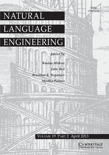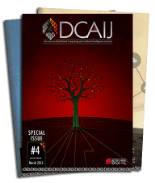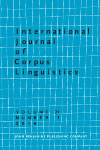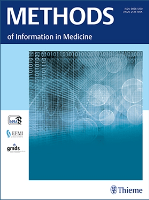
Natural Language Engineering
Scope & Guideline
Exploring the Intersection of Linguistics and AI
Introduction
Aims and Scopes
- Natural Language Processing Techniques:
The journal explores a wide array of NLP techniques, including deep learning, machine learning, and rule-based systems, to analyze and generate human language. - Corpus Linguistics and Data Annotation:
It emphasizes the importance of creating, annotating, and utilizing linguistic corpora for training NLP models, which is critical for improving their accuracy and performance. - Multilingual and Cross-Lingual Approaches:
Research frequently addresses the challenges and methodologies pertinent to processing multiple languages, highlighting advancements in multilingual NLP and cross-lingual information retrieval. - Generative Models and Text Generation:
The journal publishes studies on generative models, particularly those leveraging transformer architectures, to produce coherent and contextually relevant text. - Application of NLP in Specific Domains:
There is a strong focus on applying NLP techniques in specialized fields such as healthcare, social media, and legal contexts, showcasing the practical impact of research. - Ethics and Bias in NLP:
The journal recognizes the increasing importance of ethical considerations and bias in NLP applications, aiming to explore these themes critically.
Trending and Emerging
- Generative AI and Large Language Models (LLMs):
Recent papers show a marked increase in research focused on generative AI technologies and LLMs like GPT-3, exploring their capabilities, applications, and implications for various tasks. - Explainability and Interpretability in NLP:
There is a growing emphasis on making NLP models more interpretable, addressing the need for transparency in AI systems, especially in critical applications such as healthcare and finance. - Task-Specific Applications of NLP:
An increase in studies applying NLP techniques to specific tasks, such as toxicity detection, hate speech identification, and contextual understanding in dialogues, reflects a trend towards targeted, impactful research. - Ethics and Responsible AI:
With heightened awareness of bias and ethical issues in AI, research addressing responsible AI practices and the social implications of NLP technologies is becoming increasingly prominent. - Integration of Multimodal Data:
Emerging research is focusing on integrating textual data with other modalities, such as images and audio, to enhance the understanding and generation of language in more complex contexts.
Declining or Waning
- Rule-Based Systems:
There has been a noticeable decrease in publications centered around traditional rule-based NLP systems, as the field has increasingly shifted towards machine learning and deep learning techniques. - Basic Sentiment Analysis Techniques:
While sentiment analysis remains a key area, simpler models and methods are being overshadowed by more sophisticated approaches that incorporate contextual understanding and deep learning. - Theoretical Discussions on Linguistic Structures:
There appears to be less emphasis on theoretical explorations of linguistic structures, as practical applications and model performance evaluations take precedence in recent studies. - Manual Data Annotation Methods:
As automated and semi-automated methods for data annotation improve, the focus on manual annotation techniques has diminished, reflecting a shift towards efficiency and scalability.
Similar Journals

COMPUTATIONAL LINGUISTICS
Bridging Linguistics and Artificial IntelligenceCOMPUTATIONAL LINGUISTICS is a premier academic journal published by MIT Press, focusing on the intersection of linguistics and artificial intelligence. With the ISSN 0891-2017 and the E-ISSN 1530-9312, the journal serves as a key resource for researchers and practitioners in computational linguistics, a field that plays a crucial role in advancing language processing technologies. Since adopting an Open Access model in 2017, the journal has broadened its accessibility, encouraging a global exchange of ideas and research findings. It consistently ranks within the top quartiles of its respective fields, achieving Q1 status in Artificial Intelligence, Computer Science Applications, and Linguistics and Language as of 2023. This notable standing is further reflected in its Scopus rankings, placing it in the 99th percentile for Language and Linguistics, and maintaining a prestigious position in various computer science categories. The journal publishes cutting-edge research, theoretical frameworks, and practical applications, and aims to foster interdisciplinary collaboration among linguists, computer scientists, and AI specialists. As the field evolves, COMPUTATIONAL LINGUISTICS remains an essential platform for disseminating transformative ideas and pioneering work that shapes the future of language and technology.

International Journal of Semantic Computing
Transforming Knowledge Through Semantic InnovationThe International Journal of Semantic Computing is a premier scholarly publication focused on the intersection of artificial intelligence, computer networks, and linguistics, published by World Scientific Publishing Co PTE Ltd. Since its inception in 2007, this journal has strived to advance the field of semantic computing by promoting innovative research and interdisciplinary collaboration among professionals and academics. With a diverse scope that spans across various categories including Artificial Intelligence, Information Systems, and Linguistics, it boasts commendable rankings, particularly in the fields of Linguistics (77th Percentile) and Linguistics and Language (Rank #259/1167). The journal caters to a broad audience by offering critical insights and cutting-edge studies, thereby contributing significantly to knowledge enhancement in semantic technologies and computational linguistics. Although it does not offer open access options, its rigorous peer-review process ensures the publication of high-quality research that is invaluable for both researchers and students seeking to deepen their understanding in these rapidly evolving areas.

ADCAIJ-Advances in Distributed Computing and Artificial Intelligence Journal
Shaping Tomorrow's Technology through Research ExcellenceADCAIJ - Advances in Distributed Computing and Artificial Intelligence Journal, published by EDICIONES UNIV SALAMANCA, is an esteemed academic journal dedicated to the rapidly evolving fields of artificial intelligence, computer networks, and distributed computing. With its commitment to Open Access since 2012, the journal ensures that cutting-edge research is accessible to a global audience, fostering collaboration and innovation in the scientific community. Based in Spain, ADCAIJ is making significant strides with its current status in the Q3 quartile across various domains, including Artificial Intelligence and Information Systems. Despite its emerging status, it ranks with great potential, providing a platform for researchers to share their findings and contribute to advancements in these critical areas. The journal not only facilitates knowledge dissemination but also encourages interdisciplinary approaches that are crucial for tackling contemporary challenges. As it continues to expand its influence from 2019 through 2024, ADCAIJ is poised to play a key role in shaping future research trajectories and technological applications in its field.

PROCESAMIENTO DEL LENGUAJE NATURAL
Bridging Disciplines: Where Language Meets TechnologyPROCESAMIENTO DEL LENGUAJE NATURAL, published by the SOCIEDAD ESPAÑOLA DE PROCESAMIENTO DEL LENGUAJE NATURAL (SEPLN), is a premier journal that serves as a vital resource in the interdisciplinary fields of Computer Science and Linguistics. With an impressive 2023 impact factor ranking it as Q2 in Computer Science Applications and Q1 in Linguistics and Language, this journal offers valuable insights into the latest advancements and research trends. Based in Spain, and associated with the University of Alicante, the journal provides a platform for the dissemination of high-quality research, contributing significantly to the understanding of natural language processing and its applications. Although it operates under a traditional subscription model, the accessibility and relevance of its content make it an essential read for researchers, professionals, and students keen on exploring the intersection of language and technology. The journal’s performance, reflected in its Scopus ranks that place it in the top percentiles across various categories, reaffirms its importance in academia and its commitment to fostering innovation and knowledge in the field.

International Journal of Corpus Linguistics
Empowering Scholars to Decode LanguageThe International Journal of Corpus Linguistics, published by John Benjamins Publishing Co, is a premier academic journal dedicated to advancing the field of corpus linguistics. With an ISSN of 1384-6655 and an E-ISSN of 1569-9811, this journal serves as a pivotal platform for researchers and practitioners alike to explore the intricate relationships between language and corpora. Housed in the Netherlands and operating within the prestigious Q1 category in Linguistics and Language, the journal boasts impressive Scopus rankings, positioning it in the top percentiles of both Arts and Humanities and Social Sciences. Its commitment to rigorous peer-reviewed scholarship not only enhances understanding in the domain but also fosters collaboration among scholars. With coverage spanning from 1996 to 2024, the journal publishes cutting-edge research that contributes valuable insights into linguistic patterns and empirical studies. Whether you're an established researcher or a student embarking on your academic journey, the International Journal of Corpus Linguistics is an essential resource for anyone seeking to deepen their understanding of language through corpora.

METHODS OF INFORMATION IN MEDICINE
Pioneering Research for the Future of Healthcare Delivery.METHODS OF INFORMATION IN MEDICINE, published by Georg Thieme Verlag KG, stands at the forefront of medical knowledge dissemination, pushing the boundaries of Advanced and Specialized Nursing, Health Informatics, and Health Information Management. Established in 1962, this prestigious journal has continuously evolved to address the dynamic landscape of healthcare and information technology, aiming to bridge the gap between clinical practice and innovative information technologies. With a robust impact factor reflected in its 2023 Scopus rankings, where it holds a commendable position in Q1 for Advanced Nursing, it serves as an invaluable resource for researchers, practitioners, and students alike. While it maintains a subscription-based access model, the journal fosters the exchange of pioneering methodologies and transformative ideas that are crucial for advancing healthcare delivery and improving patient outcomes. Explore the latest research, expert insights, and cutting-edge developments that solidify the journal’s role as a leader in the interdisciplinary approach to medicine and information systems.

Language and Linguistics Compass
Connecting Scholars Across the Globe in Language ResearchLanguage and Linguistics Compass, published by Wiley, stands as a premier journal in the field of linguistics, showcasing innovative and interdisciplinary research. With its ISSN 1749-818X and E-ISSN matching, the journal has built a robust reputation, achieving an impressive Q1 ranking within the linguistics category for 2023, placing it in the top 4% of its field. Its Scopus rank of 48 out of 1167 highlights its influence and significance among linguistics journals, boasting a commendable 95th percentile. This journal serves as a vital resource for researchers, professionals, and students, offering a wide range of accessible articles that illuminate current trends and advances within the domain of language studies. Although it is not Open Access, the journal is committed to quality and diversity in its publications, ensuring scholarly articles from various sub-disciplines of linguistics are represented from 2008 through 2024. Located in the United Kingdom, Language and Linguistics Compass invites contributions from around the globe, reinforcing its status as a leading forum for linguistic discourse.

AI, published by MDPI, is a distinguished open access journal dedicated to advancing the field of artificial intelligence. Since its inception in 2020, the journal has swiftly established itself as a prominent platform for scholarly research, currently ranking in the Q2 category for 2023 within the artificial intelligence sector according to Scopus. With an impressive global reach from its base in Basel, Switzerland, the journal aims to foster innovation and collaboration among researchers, professionals, and students alike, providing a forum to share groundbreaking findings and applications in AI. The journal's commitment to accessibility ensures that research is available to a wide audience, enhancing knowledge dissemination and contributing significantly to the ongoing evolution of artificial intelligence technologies. To explore the latest in AI research, readers can access articles through their open access model, encouraging an inclusive academic environment.

Transactions of the Association for Computational Linguistics
Connecting Minds Through Language InnovationTransactions of the Association for Computational Linguistics, published by MIT Press, serves as a premier open access journal dedicated to advancing the field of computational linguistics. Established as a key resource since 2013, this journal enhances the dissemination of research, offering unlimited access to groundbreaking studies. It holds an impressive array of category quartiles in 2023, ranking in the Q1 quartile across multiple disciplines including Artificial Intelligence, Communication, Computer Science Applications, Human-Computer Interaction, and Linguistics and Language. Further emphasizing its remarkable impact, the journal ranks #1 in both Linguistics and Communication, placing it at the forefront of social sciences. These factors contribute to an overall Scopus percentile ranking that epitomizes the journal's relevance and superiority within its domain. As researchers, professionals, and students seek to explore and contribute to the rapidly evolving landscape of language technology, this journal stands as an indispensable platform for sharing innovative ideas and studies within the community.

Frontiers in Artificial Intelligence
Bridging Disciplines in the AI LandscapeFrontiers in Artificial Intelligence, published by FRONTIERS MEDIA SA, is a pioneering open-access journal that commenced in 2018, dedicated to advancing the multifaceted field of artificial intelligence. With an impressive Q2 ranking in the category of Artificial Intelligence, it occupies a significant position within the academic community, offering a platform for high-quality, peer-reviewed research. The journal's comprehensive scope encompasses a variety of subfields, including machine learning, robotics, and human-computer interaction, making it an invaluable resource for researchers, professionals, and students alike. As an open-access journal since 2019, it ensures that cutting-edge research is readily available to a global audience, facilitating knowledge sharing and collaboration. With its headquarters in Switzerland and a commitment to scholarly excellence, Frontiers in Artificial Intelligence is at the forefront of the scientific discourse, empowering the next generation of innovations in AI.